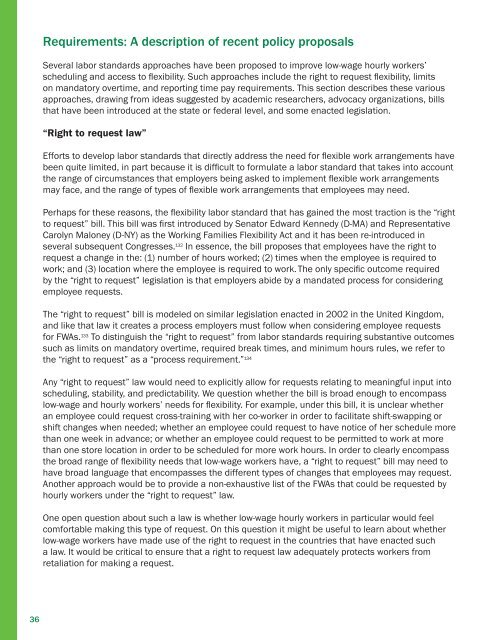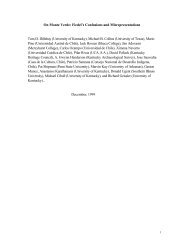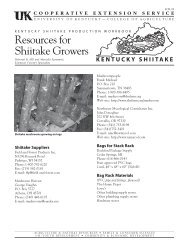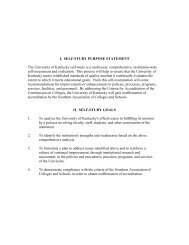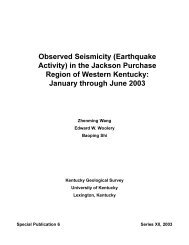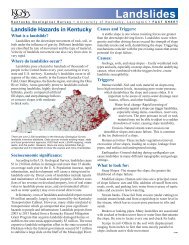Flexible Workplace Solutions for Low-Wage Hourly Workers
Flexible Workplace Solutions for Low-Wage Hourly Workers
Flexible Workplace Solutions for Low-Wage Hourly Workers
You also want an ePaper? Increase the reach of your titles
YUMPU automatically turns print PDFs into web optimized ePapers that Google loves.
Requirements: A description of recent policy proposals<br />
Several labor standards approaches have been proposed to improve low-wage hourly workers’<br />
scheduling and access to fl exibility. Such approaches include the right to request fl exibility, limits<br />
on mandatory overtime, and reporting time pay requirements. This section describes these various<br />
approaches, drawing from ideas suggested by academic researchers, advocacy organizations, bills<br />
that have been introduced at the state or federal level, and some enacted legislation.<br />
“Right to request law”<br />
Ef<strong>for</strong>ts to develop labor standards that directly address the need <strong>for</strong> fl exible work arrangements have<br />
been quite limited, in part because it is diffi cult to <strong>for</strong>mulate a labor standard that takes into account<br />
the range of circumstances that employers being asked to implement fl exible work arrangements<br />
may face, and the range of types of fl exible work arrangements that employees may need.<br />
Perhaps <strong>for</strong> these reasons, the fl exibility labor standard that has gained the most traction is the “right<br />
to request” bill. This bill was fi rst introduced by Senator Edward Kennedy (D-MA) and Representative<br />
Carolyn Maloney (D-NY) as the Working Families Flexibility Act and it has been re-introduced in<br />
several subsequent Congresses. 132 In essence, the bill proposes that employees have the right to<br />
request a change in the: (1) number of hours worked; (2) times when the employee is required to<br />
work; and (3) location where the employee is required to work. The only specifi c outcome required<br />
by the “right to request” legislation is that employers abide by a mandated process <strong>for</strong> considering<br />
employee requests.<br />
The “right to request” bill is modeled on similar legislation enacted in 2002 in the United Kingdom,<br />
and like that law it creates a process employers must follow when considering employee requests<br />
<strong>for</strong> FWAs. 133 To distinguish the “right to request” from labor standards requiring substantive outcomes<br />
such as limits on mandatory overtime, required break times, and minimum hours rules, we refer to<br />
the “right to request” as a “process requirement.” 134<br />
Any “right to request” law would need to explicitly allow <strong>for</strong> requests relating to meaningful input into<br />
scheduling, stability, and predictability. We question whether the bill is broad enough to encompass<br />
low-wage and hourly workers’ needs <strong>for</strong> fl exibility. For example, under this bill, it is unclear whether<br />
an employee could request cross-training with her co-worker in order to facilitate shift-swapping or<br />
shift changes when needed; whether an employee could request to have notice of her schedule more<br />
than one week in advance; or whether an employee could request to be permitted to work at more<br />
than one store location in order to be scheduled <strong>for</strong> more work hours. In order to clearly encompass<br />
the broad range of fl exibility needs that low-wage workers have, a “right to request” bill may need to<br />
have broad language that encompasses the different types of changes that employees may request.<br />
Another approach would be to provide a non-exhaustive list of the FWAs that could be requested by<br />
hourly workers under the “right to request” law.<br />
One open question about such a law is whether low-wage hourly workers in particular would feel<br />
com<strong>for</strong>table making this type of request. On this question it might be useful to learn about whether<br />
low-wage workers have made use of the right to request in the countries that have enacted such<br />
a law. It would be critical to ensure that a right to request law adequately protects workers from<br />
retaliation <strong>for</strong> making a request.<br />
36


